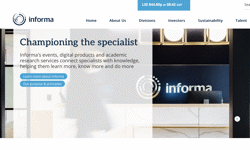
It was Tuesday 17th March 2020, a week before the formal UK lockdown, when we all exited our building to start a new remote working life.
We weren’t alone. Like many businesses since the crisis started, we experienced the unknown, initial mild panic, then a more measured calmness, planning at pace and then a more outward looking perspective on the future for the business (much like described by Jim Bilton in his latest Media Futures report).
Whilst industry talk of survival has mostly (and understandably) been about retaining and diversifying revenues (paid for content, membership, subscription, data, digital events, technology), what the crisis has illustrated is that organisations will need to be as much focused on cost management.
In effect, blending cost management and improved cash-flow with growth ambitions will become a strategic imperative. Why? Because reducing costs and increasing cash-flow allows you to invest for growth, fulfil strategic ambitions and manage risk, too.
Cost ‘management’ doesn't just mean cutting costs. It can be that, but it also provides an organisation with the confidence to maximise the value of its spend, the ability to free up cash-flow where there are savings to be made and the opportunity to then invest in the right products and services to grow the business.
So, what are the levers that organisations should think about going forward. What lessons can we learn from managing a business (not just in a crisis but through it and out of it), how do organisations activate an ‘always on’ preparedness, what are the levers to manage costs effectively, to increase cash-flow and invest for growth?
Blending cost management and improved cash-flow with growth ambitions will become a strategic imperative.
Be prepared
It is the state of preparedness that Mark Allen, chair of the Mark Allen Group subscribed to, even before the onset of the crisis. Preparation for his business came in three parts: continually revised budgets and forecasts based on various levels of performing scenarios; a keen eye on cash-flow and an outward looking view on potential acquisitions.
And that’s the critical point. Reducing costs and increasing cash-flow is not just about cost reductions, savings and the bottom line. It is that, but it also contributes to investing for growth. It releases cash to invest for growth (talent, technology, markets, products and services) and that will become very apparent as we emerge from a challenging 2020.
Rory Brown, founder of AgriBriefing comments that, “there are always events out of our control. Fixing the roof while the sun shines is important and having a resilient business model is important.”
And whilst many businesses would have been caught out by the impact of the crisis, fixing the roof while the sun shines should be the new operational normal for any business.
Rory Brown believes that a combination of more effective planning, managing risk and acquisitions has put them on the front foot and in control of the business: “What we have done since buying Farmers Guardian in 2012 is steadily make our business more resilient through product development and shrewd acquisitions. We went into this year with 60% of our revenues coming from high value subscriptions with strong renewal rates and that has insulated us. All of those markets have grown strongly.”
One initiative that Rory Brown is proud of is the launch of their 'mini MBA' workshops, for all of their teams, showing them the three levers they can pull, to not just survive but grow business (sell more, control costs and improve margin).
It’s a point that Gareth Rogers, CEO of Farnborough International reflects too: “One of the positives (if that’s the right word) is that we’ve seen a change in mindset across the business, that ownership, success and survival doesn’t just rest at the top of an organisation but with everyone playing their part in helping the business survive and thrive. Challenging the norm has been demonstrated by everyone.”
Andy Baker, managing director at The Lawyer, sees customer centricity and curiosity as a lesson from the crisis: “Cost management and cash-flow of course is key for any business, but I think if the crisis has taught us one thing, it’s the importance of customer curiosity. Bringing customers closer into an organisation and including them in the development of its products and services. The crisis has meant we’ve all been a bit more open and transparent and I think successful media businesses going forward will need to be more curious about its customers and audiences to grow.”
It’s these levers that have the ability to generate cash-positive businesses. But what specifically can teams take ownership of when it comes to managing costs and creating available cash to sustain the business?
Fixing the roof while the sun shines should be the new operational normal for any business.
Cash-flow: not just king, but the whole deck of cards
Cash and cash-flow is the life-blood of any business. Good cash-flow comes from good cost management: tracking expenditure, analysing overheads, benchmarking pricing, determining value generated, supplier management, negotiating new terms and more.
And generating positive cash-flow (according to Koch & Nieuwenhuizen) can also come from:
- identifying how and where businesses make the most revenue, profit & cash;
- understanding customers and why they buy your products and services;
- improving profit margins, either stand alone or via a blend of product mix, customer segments, pricing or cutting costs;
- illustrating why you have been successful or unsuccessful in particular projects;
- outlining what products or services you want to retain or streamline.
Investing for growth could include new websites, developing and implementing a new CRM platform, identifying and activating a new virtual or hybrid event platform, building a new broadcast studio, or investing in new skills and capabilities.
Whilst each is a cost, their purpose is to drive value.
Each requires a business case too:
- what are we spending currently?
- what will a new product or service provide in terms of growth?
- what’s it going to cost?
- how do I negotiate the best price and retain quality and value?
Cost management will be critical for businesses coming out of the crisis.
“Cost management matters,” says Gareth Rogers, “but so does growth and we’ve found a sensible balance of reducing our costs but looking at new initiatives in parallel.”
So how should businesses address and balance cost management with investment for growth. Where do you start?
Peter Smith, author of Bad Buying: How organisations waste billions through failures, frauds and f*ck-ups believes that the crisis will bring about the need for a step change in how media and marketing services businesses operate going forward.
Firstly, that ‘data is a pretty essential starting point’:
- How much are you spending, on what, with which suppliers?
- Who internally is spending the money?
- How much time are they spending on it?
- Are you tracking and benchmarking your costs?
In effect, if you don’t have that information available, you need to get it.
Secondly, that ‘the easiest way to save money is not to spend it’:
- Do you have the right controls in place, who can spend budget?
- How much and on what?
- Is spend properly authorised?
Thirdly, when analysing expenditure, look for savings opportunities:
- Discretionary. Do you really need a new laptop now or the fish tank in reception?;
- Business basics. Such as reducing the level or frequency of office cleaning, renegotiating contracts with print suppliers, photocopy services too;
- Risk related. Reducing insurance cover, for instance, would be an obvious case, but it might be a more subtle saving like finding a cheaper lawyer or accounting firm to reduce professional services costs. However, if they are less competent, that could end up costing you money;
- Value spend. Many “costs” are in fact drivers of value for a business (competitive advantage, revenue, profit) like the examples earlier. So, by all means look at these carefully, but with a value focus, not simply as a cost.
Recovery and rebuilding will be dependent on investment and cash and that will be predicated on good cost management.
Out of the Fire. Into the Fire.
Will lessons be learned as we emerge from the crisis and over the next number of years?
With the roll-out of a new vaccine and a surge in confidence from stock markets globally, we all cautiously see some light at the end of the tunnel.
As we return to a more normal state, the impact on media and marketing services businesses could be significant in that we may see a different normal.
For general business operations, it could be more remote working, less or reduced physical office space, a hybrid model, a change in user technology and communications, less travel, a change in requirement for utilities, insurance, training and development.
So, we might see a reduction in the cost base for some areas, but a requirement to invest for growth in others.
- how will you monitor and measure those increases and decreases?
- how will you select new services partners?
- do you have the expertise to negotiate new insurance policies?
- how will you balance and cost a hybrid working model?
- if you’re going to invest in new technology and communications, which partners will you select?
- what will be your selection criteria and how do all of those elements contribute to investing for growth?
And so, whilst cost management, always on preparedness and cash-flow will be key, blending it with a change in mindset for the many and not just the few across the whole organisation and a more customer curious culture will become the new norm.
It won’t be easy.
Many organisations are still recovering from the sustained impact of the crisis and whilst they have not been short of ideas and initiatives to rebuild and grow, the core challenge of facilitating positive cash-flow remains.
Recovery and rebuilding will be dependent on investment and cash and that will be predicated on good cost management. What the crisis has shown is that good cost management and investment for growth will go hand in hand.
Thank you to Gareth Rogers, CEO of Farnborough International, Mark Allen, chairman of the Mark Allen Group, Andy Baker, managing director, The Lawyer, Peter Smith, author of Bad Buying and Rory Brown, founder of AgriBriefing, for their time, insight and perspective.
This article was first published in InPublishing magazine. If you would like to be added to the free mailing list, please register here.










